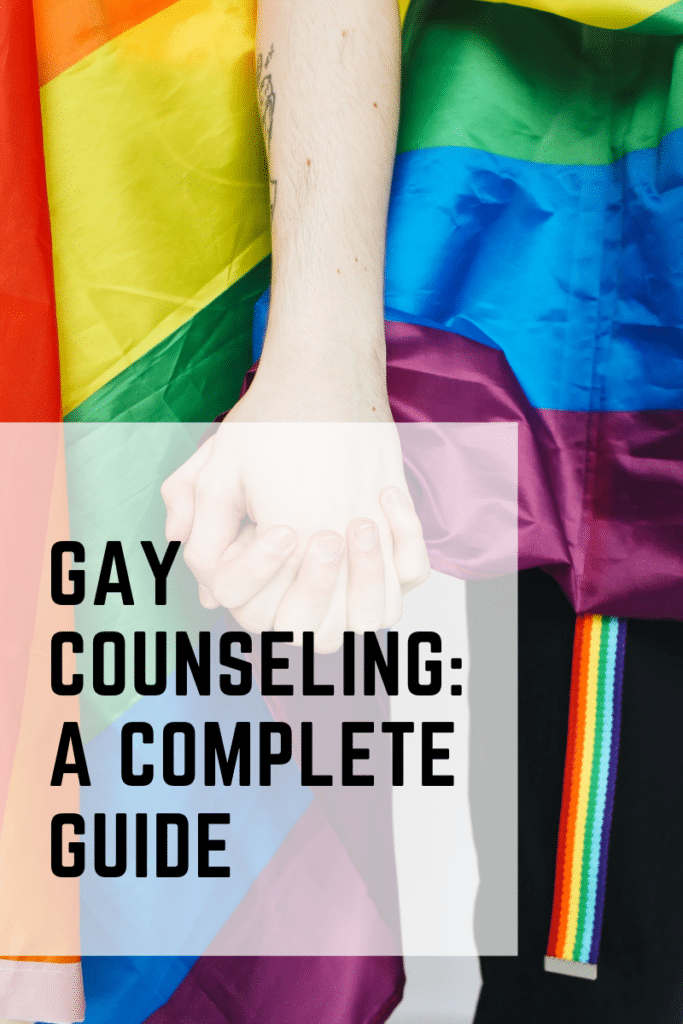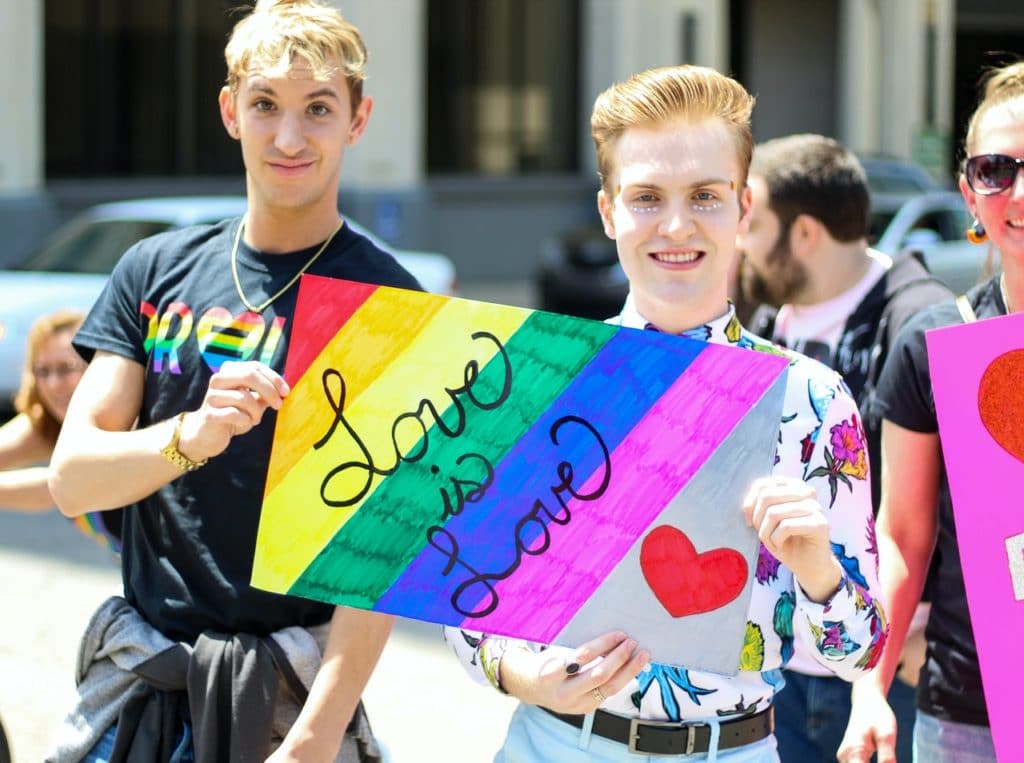Do any of these scenarios sound familiar?
- You’ve sort out counseling but ended up canceling prematurely since your counselor was uneducated on sexuality, identity, and gender issues.
- You’re afraid to seek therapy since you suspect your therapist won’t understand some of the issues related to you as an LGBTQ individual.
- You’ve previously had to educate a counselor on matters relating to the LGBTQ community.
If you answered ‘YES’ to any of the above scenarios, this complete guide is meant for you. In today’s article, we discuss everything there is to know about gay counseling. Whether you’re looking to hire an LGBTQ counselor or would want to become a gay counselor, this article is meant for you.
Here’s what you’ll learn:
Let’s get right into it.

What is Gay Counseling
Gay counseling is a form of non judgemental therapy whose main focus is to help members of the LGBTQ community create satisfying, meaningful, and healthy relationships. In a way, gay counseling is similar to traditional counseling but focuses more on members of the LGBTQ community.
You may wonder, “why specifically focus on LGBTQ individuals?”
It’s simple.
While LGBTQ individuals experience the same mental health issues as non-LGBTQ individuals, gays, lesbians, bisexuals, transgender, and queers also have their set of unique challenges. Gay affirmative counselors are specifically trained to help with common mental health issues as well as these issues.
Gay Counseling Vs. Conversion Therapy
Gay counseling is often confused with conversion therapy. However, these two types of therapies are as different as day and night.
As mentioned above, gay counseling aims to help LGBTQ clients deal with different mental health issues and create authentic and meaningful relationships. Gay affirmative counseling seeks to promote acceptance and doesn’t attempt to change a person’s sexual orientation.
On the other hand, conversion therapy is a psychiatric treatment that aims to change a person’s sexual orientation from LGBTQ+ to heterosexual. While it’s a widely known fact that a person has no control over their sexual orientation, conversion therapists believe that sexual orientation is a mental disorder that can be treated.
This negative assumption has resulted in multiple countries outlawing the practice, with some organizations considering conversion therapy as a form of torture.
Now that you know the difference between LGBTQ counseling and conversion therapy, let’s get into why peoples seek gay counseling.
Why do People Seek Gay Counseling?
Studies suggest that people who identify as LGBTQ+ seek mental health treatment at higher rates than heterosexuals.
Part of the reason is due to the discrimination and stigma associated with this community. LGBTQ individuals are more likely to experience bullying, isolation, sexual assault, and rejection. Not to mention the constant fear of violence against them.
Thanks to this oppression, marginalization, and discrimination, LGBTQ+ individuals report higher instances of anxiety, depression, and other mental health problems at a higher rate than non-LGBTQ. People who identify as LGBTQ are also at a higher risk of having a drug and substance abuse problem.
And that’s not all!
A 2016 study on teens who identified as LGBTQ found that these teens were twice as likely to experience suicidal thoughts when compared to their non-LGBTQ counterparts.
LGBTQ individuals in Washington DC may also seek counseling to deal with issues common to most people. This includes low self-esteem, dealing with in-laws, mood swings, and general anxiety.
However, some issues may require one to seek a gay-affirmative counselor’s help specifically. These include:
Sexual Identity Issues
One of the most common problems LGBTQ individuals experience is the constant questioning of their sexual identity. However, questioning the emotions, thoughts, feelings, and fantasies that influence an individual’s romantic and sexual attraction can cause confusion and stress.
This stress and confusion are some of the reasons why LGBTQ individuals in Washington DC may seek gay counseling.
Closely related to sexual identity is the issue of coming out and how friends and family react. Due to cultural and societal considerations, the thought and process of coming out may be a cause of tremendous stress, hence the need for gay affirmative counselors.
Gender Dysphoria
Gender Dysphoria is a DSM-5 listed psychological condition commonly experienced by LGBTQ individuals. People suffering from gender dysphoria experience significant distress when their sexual identity doesn’t correspond with their birth-assigned gender.
In certain instances, this distress may cause impairment in daily routine functions, thus the need for counseling.
Gender Transition Issues
Most people who choose to outwardly transition experience numerous mental distress instances due to how people view them.
These individuals may choose to see a gay-friendly therapist to process anxiety, anger, and sadness. People seeking to transition may also seek counseling to discuss some of the complexities and complications likely to arise with the transition.
Transgender people in Washington DC are also likely to seek counseling as they adjust to their new life.
Couples in Conflict over Coming Out
It’s not uncommon to come across gay couples where one person is open about their sexuality, while the other tries to keep it a secret.
In most instances, this leads to conflict and constant fighting. Gay couples in may seek the help of an LGBTQ counselor in Washington DC to help them communicate and understand each other better.

Gay Therapy Practice Areas
Gay affirmative counselors’ practice in two main areas: These are:
Individual Counseling
Individual counseling is just like it sounds. It’s you and the counselor working together to help understand your historical and present behavioral patterns. This includes helping clients deal with issues of sexuality, family conflict, body image, trauma, and coming out, among other individual challenges.
Individual therapy helps the client better understand themselves, making it easier for them to create lasting and meaningful relationships.
Couples Counseling
Like heterosexual couples, LGBTQ relationships also have their ups and downs. However, the intricacies of gay relationships may be a bit different from those of heterosexual relationships; thus, the need for gay couples therapy.
A gay-affirmative counselor can help LGBTQ couples deal with communication, monogamy, intimacy, HIV, religion, and cultural differences, among other issues.
Now that you know the various issues that make people seek out gay counseling, let’s get into choosing an LGBTQ counselor.
Choosing an LGBTQ Counselor
Consider their Academic Qualifications
Before anything else, make sure your chosen counselor/therapist is trained and certified by a recognized body. You wouldn’t want to be treated by a quack therapist.
When considering academic qualifications, make sure you also consider your counselor’s training and experience on issues relating to the lesbian gay and bizexual and transgender population. Such training includes training on how to deal with
- Internalized homophobia
- Self-destructive behaviors
- Coming out
- Issues on sexuality
- Issues relating to LGBTQ relationships.
While your gay counselor may not be familiar with all these topics, make sure to choose one who’s knowledgeable about your specific needs.
Consider their experience with the LGBTQ population.
Since counseling and therapy are extremely personal experiences, it’s essential that your counselor understands and can relate to some of your experiences.
If you’re looking for a gay counselor in Washington DC, it’s best to find one who has direct experience on what it means to be a member of the LGBTQ+ population in Washington DC.
One of the easiest ways to ensure your chosen therapist understands what it means to live as an LGBTQ individual is by looking for one who’s gay. Working with a counselor who identifies as part of the lesbian gay and bisexual popiulation will make it easier for them to relate to problems such as coming out and also makes it easier for you to discuss issues openly.
Consider A Counselor You’re Comfortable With.
As mentioned earlier, counseling is a deeply personal experience. When searching for a gay counselor, it’s important to choose one with whom you’re comfortable. Look for a counselor whom you can openly talk to about all issues. This includes issues related to sex and intimacy, among other topics.
However, it’s important to remember that the counselor and client relationship should remain strictly professional when considering comfortability.
Maybe you feel like you can help members of the LGBTQ community to improve their mental health and relationships. However, you don’t know-how. In the next section, we delve into what you need to do to become a gay-friendly counselor.
How to Become a Gay-Affirmative Counselor
Becoming a gay-affirmative counselor in Washington DC isn’t that different from becoming a traditional counselor. For any counselor or therapist, the first step to establishing a practice is getting the necessary training.
With the basic counseling training, you’ll have established a strong foundation for your gay-affirmative counseling career.
After getting your counseling certification, you should educate yourself on gay-affirmative psychological practices. Take time to learn about some of the common issues that people in the LGBTQ communities face. These include issues on internalized homophobia, stages of coming out, behavioral issues, intimacy issues in gay relationships, and cognitive dissonance, among others.
Take time to read books on how to work with people in the LGBTQ community. Familiarize yourself with issues affecting LGBTQ people in your community. Understanding the issues affecting the LGBTQ community around you will allow you to better relate to their experiences.
In your practice, there are several things you can do to ensure you maintain a gay-affirmative environment.
For starters, you should start by openly discussing your stance on the LGBTQ population with your colleagues, clients, and family. You should also include LGBTQ literature in the waiting area and acknowledge LGBTQ relationships in sign-up forms.
As an LGBTQ+ counselor in Washington DC, you should also be actively involved in gay and lesbian community events and activities. You should also make continuous effort to educate yourself on issues related to the LGBTQ community.
Even if you’re gay, you should make sure to stay updated on all LGBTQ issues.
Any Further Questions?
There you go. An extensive guide into gay counseling.
We hope you now have a clear understanding of what LGBTQ counseling entails. If you’re looking to hire an LGBTQ counselor, or are looking to become a gay-affirmative counselor, we hope this article pointed you in the right direction.
In case any questions on the topic of gay counseling, please ask them in the comment section below.
I’ll be sure to respond to any question asked.
Related Content
Pride Counseling Review – Best Comprehensive Review
